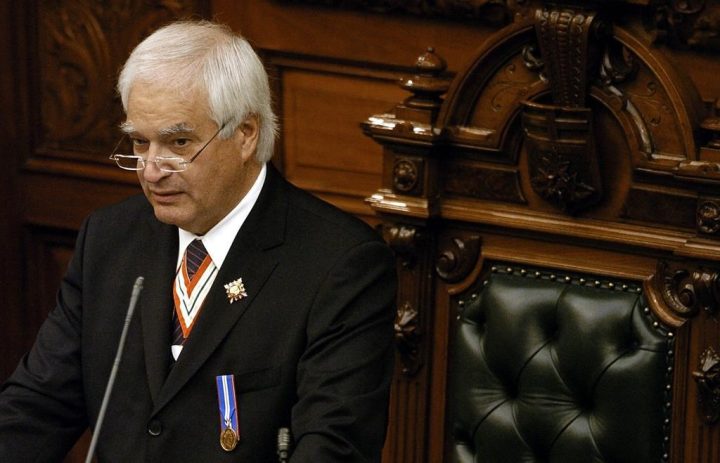Former Ontario lieutenant-governor and diplomat James Bartleman’s career took him to nearly every corner of the world, but it seemed he was never far from his impoverished Port Carling, Ont., upbringing and pride in his Indigenous roots.

Bartleman died this week at the age of 83, current Lt.-Gov. Elizabeth Dowdeswell announced Thursday. He used his time in the viceregal position to fight racism and discrimination and to uplift young Indigenous people, she said, including launching the first Lieutenant Governor’s Book Drive, which collected 1.2 million books for First Nations schools and Native Friendship Centres.
“As a proud member of the Chippewas of Rama First Nation, Mr. Bartleman was a staunch advocate for Indigenous Peoples, following the guidance of his ancestors by imparting his wisdom to future generations,” Dowdeswell wrote.
“His accomplishments are particularly poignant given the hardships he and his family faced in his childhood, including poverty and anti-Indigenous racism.”
His son, Alain Bartleman, said his father’s example shows that “through grit and determination, the barriers of circumstance can be overcome.”
“The story of his life is a testament to the power of determination and resilience, and his success is an inspiration to countless others,” Bartleman’s son wrote in a statement.
Bartleman was born in the Muskoka region, and wrote in several books about the traumatic racism he experienced growing up.
“It was as if everything I’d done in life had been a preparation for my new role,” Bartleman wrote of his job as lieutenant governor in his most recent memoir, “Seasons of Hope.”
Living near the dump in Port Carling where he found “sometimes torn but still readable” comic books that taught him to read, having racistinvectives hurled at him and his family members in town, forming a deep attachment for the land in Muskoka, and spending 35 years in Ottawa and on six continents on diplomatic missions all put him on a path to becoming the Queen’s representative in Ontario, he wrote.
“I loved being lieutenant governor,” Bartleman wrote.
“I enjoyed meeting people and hearing their life stories, listening to their jokes, and giving them a shoulder to cry on. Public speaking, which I had never enjoyed as a public servant when I had to adhere to the line of whatever government was in power, I embraced when I could speak frankly about social causes important to me, especially the plight of Indigenous children.”
Bartleman got what he calls his “big break” as a teenager when the caretaker for Robert Clause, an American with a summer estate on Lake Joseph in Muskoka, offered him a summer job. He spent seven summers working there, and after Bartleman finished Grade 12, Clause offered to fund higher education for Bartleman.
“I remember walking back in a daze to where I’d been cutting wood, staring at huge white cumulus clouds in a deep blue Muskoka sky and listening to the lapping of the Lake Joseph water on the shore of that deserted part of the island, wondering – why me?” he wrote.
Bartleman studied history at what was then known as the University of Western Ontario, and wrote that he soaked up education wherever he could, sitting in on lectures about global affairs, music appreciation, religion and ethics, as well as joining history, United Nations and social service clubs.
Bartleman served as a diplomat for more than 30 years, including as ambassador to Cuba, ambassador to Israel, ambassador to the European Union, and ambassador to the North Atlantic Council of the North Atlantic Treaty Organization.
“Mr. Bartleman was renowned for his creativity in fostering cultural exchanges, emphasizing the role of diplomacy in building mutual respect and understanding,” Dowdeswell wrote.
“His profound dedication to his duties, detailed knowledge of international affairs, and exceptional ability to handle crisis situations earned him widespread respect in diplomatic circles.”
While posted to South Africa as a senior diplomat, he was brutally attacked in a hotel room, and began experiencing daily nightmares about his childhood. A few years later Bartleman began what he called the “therapeutic magic” of putting pen to paper, and he found that writing memoirs of his youth and the racism he experienced, as well as novels with Indigenous protagonists, helped in his healing process.
“Mr. Bartleman left an indelible mark on Canadian literature through his five non-fiction books and three novels,” Dowdeswell wrote.
“His unique storytelling ability told not only his own narrative but also the stories of countless others who found a voice through his words. He will be dearly missed by many.”
Education and literacy were cornerstones of Bartleman’s legacy, his son said.
“Through his writing, he shared the beauty and resilience of First Nations culture, fostering unity and reconciliation within our diverse province,” he wrote in his statement.
The Bartlemans are asking for privacy as they mourn, but Alain Bartleman said people who want to further his father’s work in reconciliation and education can donate to United for Literacy and to the Mikinakoos Children’s Fund.



Comments